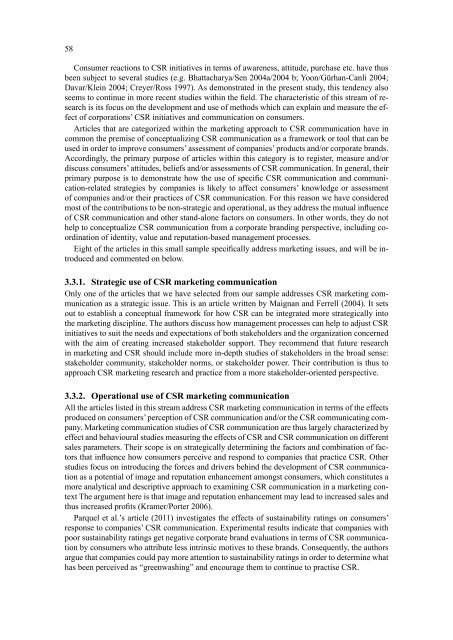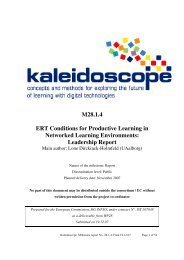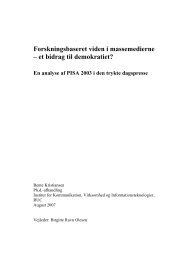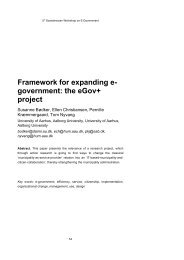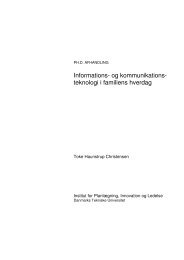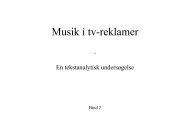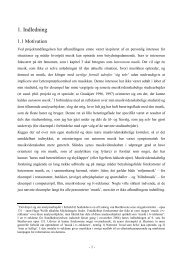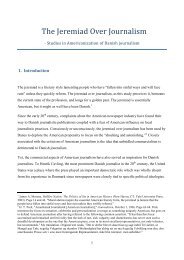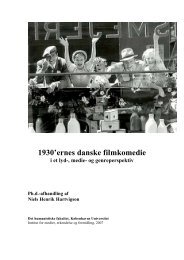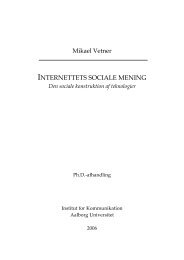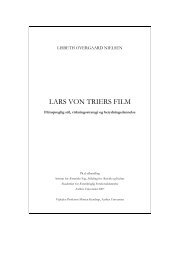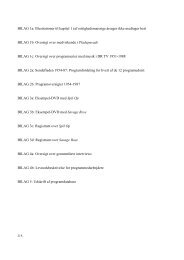Download - Hermes - Journal of Linguistics
Download - Hermes - Journal of Linguistics
Download - Hermes - Journal of Linguistics
You also want an ePaper? Increase the reach of your titles
YUMPU automatically turns print PDFs into web optimized ePapers that Google loves.
58<br />
Consumer reactions to CSR initiatives in terms <strong>of</strong> awareness, attitude, purchase etc. have thus<br />
been subject to several studies (e.g. Bhattacharya/Sen 2004a/2004 b; Yoon/Gürhan-Canli 2004;<br />
Davar/Klein 2004; Creyer/Ross 1997). As demonstrated in the present study, this tendency also<br />
seems to continue in more recent studies within the field. The characteristic <strong>of</strong> this stream <strong>of</strong> research<br />
is its focus on the development and use <strong>of</strong> methods which can explain and measure the effect<br />
<strong>of</strong> corporations’ CSR initiatives and communication on consumers.<br />
Articles that are categorized within the marketing approach to CSR communication have in<br />
common the premise <strong>of</strong> conceptualizing CSR communication as a framework or tool that can be<br />
used in order to improve consumers’ assessment <strong>of</strong> companies’ products and/or corporate brands.<br />
Accordingly, the primary purpose <strong>of</strong> articles within this category is to register, measure and/or<br />
discuss consumers’ attitudes, beliefs and/or assessments <strong>of</strong> CSR communication. In general, their<br />
primary purpose is to demonstrate how the use <strong>of</strong> specific CSR communication and communication-related<br />
strategies by companies is likely to affect consumers’ knowledge or assessment<br />
<strong>of</strong> companies and/or their practices <strong>of</strong> CSR communication. For this reason we have considered<br />
most <strong>of</strong> the contributions to be non-strategic and operational, as they address the mutual influence<br />
<strong>of</strong> CSR communication and other stand-alone factors on consumers. In other words, they do not<br />
help to conceptualize CSR communication from a corporate branding perspective, including coordination<br />
<strong>of</strong> identity, value and reputation-based management processes.<br />
Eight <strong>of</strong> the articles in this small sample specifically address marketing issues, and will be introduced<br />
and commented on below.<br />
3.3.1. Strategic use <strong>of</strong> CSR marketing communication<br />
Only one <strong>of</strong> the articles that we have selected from our sample addresses CSR marketing communication<br />
as a strategic issue. This is an article written by Maignan and Ferrell (2004). It sets<br />
out to establish a conceptual framework for how CSR can be integrated more strategically into<br />
the marketing discipline. The authors discuss how management processes can help to adjust CSR<br />
initiatives to suit the needs and expectations <strong>of</strong> both stakeholders and the organization concerned<br />
with the aim <strong>of</strong> creating increased stakeholder support. They recommend that future research<br />
in marketing and CSR should include more in-depth studies <strong>of</strong> stakeholders in the broad sense:<br />
stakeholder community, stakeholder norms, or stakeholder power. Their contribution is thus to<br />
approach CSR marketing research and practice from a more stakeholder-oriented perspective.<br />
3.3.2. Operational use <strong>of</strong> CSR marketing communication<br />
All the articles listed in this stream address CSR marketing communication in terms <strong>of</strong> the effects<br />
produced on consumers’ perception <strong>of</strong> CSR communication and/or the CSR communicating company.<br />
Marketing communication studies <strong>of</strong> CSR communication are thus largely characterized by<br />
effect and behavioural studies measuring the effects <strong>of</strong> CSR and CSR communication on different<br />
sales parameters. Their scope is on strategically determining the factors and combination <strong>of</strong> factors<br />
that influence how consumers perceive and respond to companies that practice CSR. Other<br />
studies focus on introducing the forces and drivers behind the development <strong>of</strong> CSR communication<br />
as a potential <strong>of</strong> image and reputation enhancement amongst consumers, which constitutes a<br />
more analytical and descriptive approach to examining CSR communication in a marketing context<br />
The argument here is that image and reputation enhancement may lead to increased sales and<br />
thus increased pr<strong>of</strong>its (Kramer/Porter 2006).<br />
Parquel et al.’s article (2011) investigates the effects <strong>of</strong> sustainability ratings on consumers’<br />
response to companies’ CSR communication. Experimental results indicate that companies with<br />
poor sustainability ratings get negative corporate brand evaluations in terms <strong>of</strong> CSR communication<br />
by consumers who attribute less intrinsic motives to these brands. Consequently, the authors<br />
argue that companies could pay more attention to sustainability ratings in order to determine what<br />
has been perceived as “greenwashing” and encourage them to continue to practise CSR.


